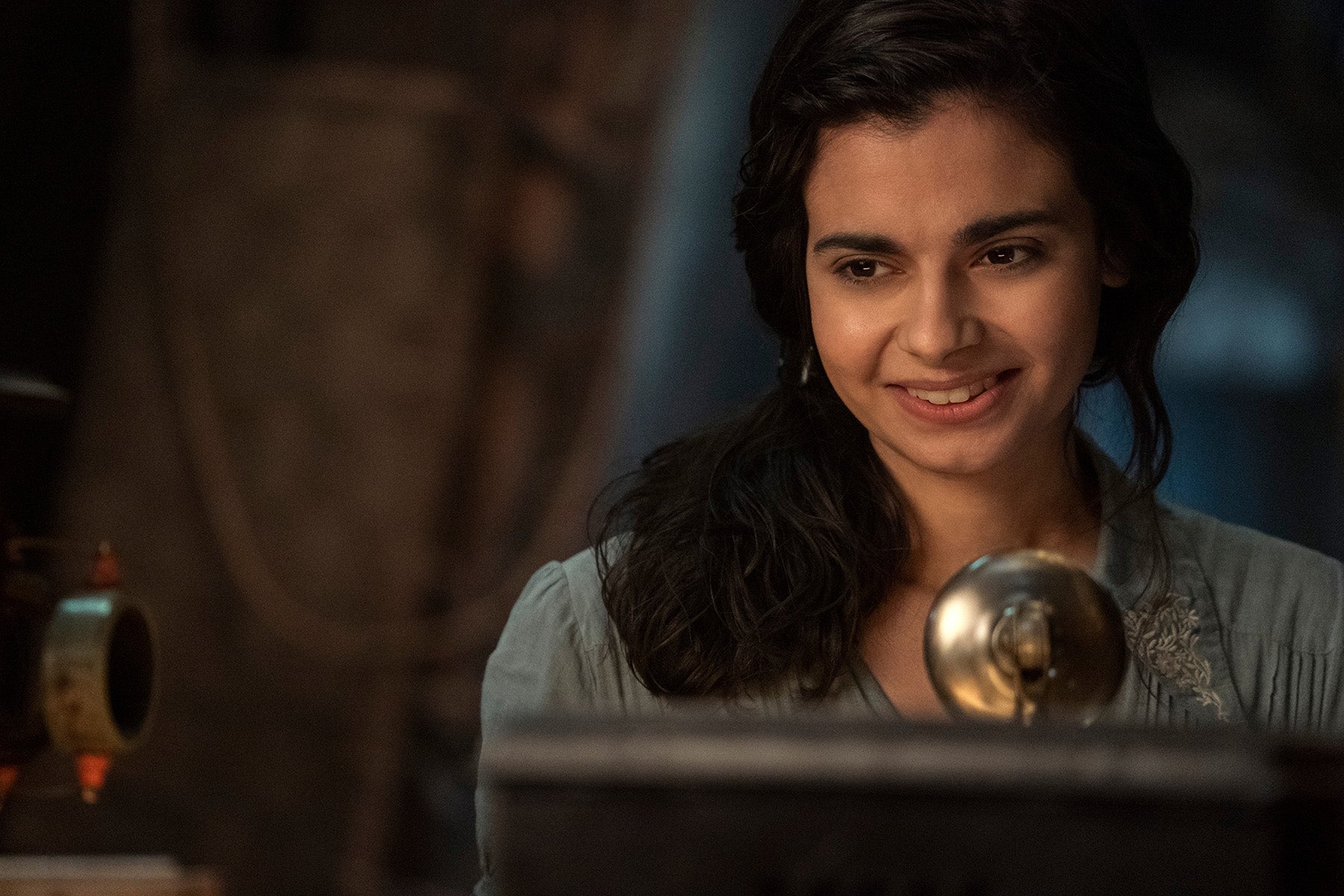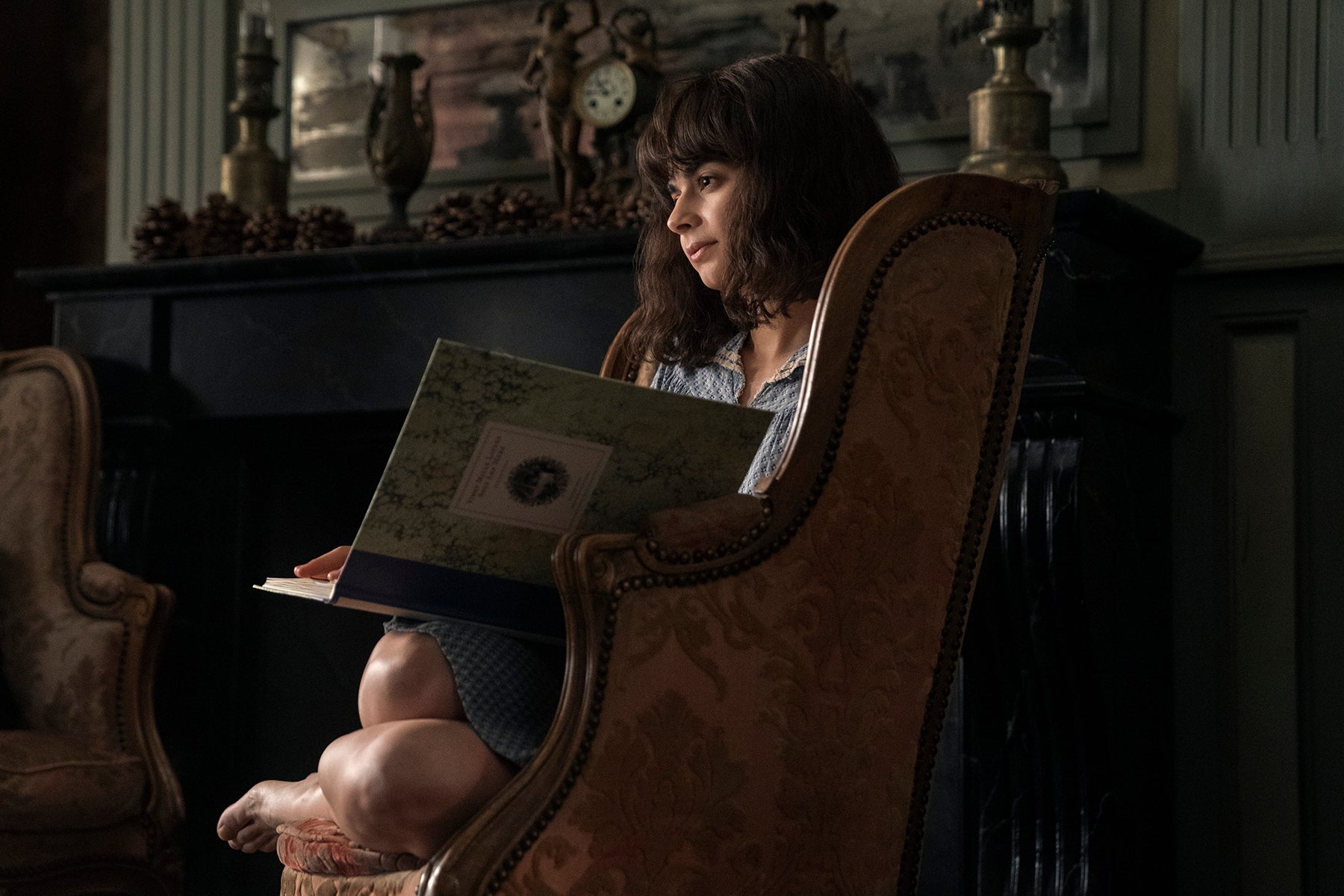Aria Mia Loberti ’20 is no stranger to hard work. As a University of Rhode Island (URI) Honors Program student with a triple major in philosophy, political science, and communication, and double minor in ancient Greek and rhetoric, she immersed herself in her studies, graduating summa cum laude. She then received a master’s degree in ancient rhetoric on a Fulbright Scholarship at Royal Holloway, University of London. In 2021, she began her Ph.D. at Pennsylvania State University—on track for a research career. Life, however, had another path in mind.
During the first semester of her doctorate, Loberti landed her debut acting role as the lead in All The Light We Cannot See. The World War II drama follows a teenager in the French Resistance. It premiered on Netflix in November 2023.
Her life of classrooms and ancient texts morphed into one of constant travel and screenplays. Loberti moved to Budapest, Hungary, to begin the six-month process of filming the adaptation of Anthony Doerr’s Pulitzer Prize-winning novel. Produced and directed by Shawn Levy, the series also stars Mark Ruffalo and Hugh Laurie.
“It honestly surprised me how much my academic work helped me then and helps me every single day, now, as a professional actress,” Loberti says. While at URI, Loberti published articles in peer reviewed journals and presented her work at conferences around the world.
“At its core,” Loberti tells us, “my research was about how words have power to shape our reality. And that is the power of storytelling. And of acting.”
Loberti’s character, Marie-Laure, transmits coded illegal radio messages from occupied France to the Allies, facing the life-threatening danger of being discovered by the Nazis. One of her avid listeners is Werner (Louis Hofmann), a young German soldier who has been tasked, against his will, with tracking down Marie-Laure.
To lay the foundation for Marie-Laure’s tragic, yet hopeful story, Loberti painted a picture of what life would have been like for her character. Her ability to dive in head first is something she attests to her rigorous academic training.

“I would sit for hours and make spreadsheets that connected book passages to lines in the script,” Loberti says, “like I was preparing for a thesis.”
She researched historical accounts of the Nazi occupation, listened to radio recordings from the period, dug up archival photographs, and studied the liberation of Marie-Laure’s town, Saint-Malo. With the help of a dialect coach, she perfected Marie-Laure’s period-accurate voice.
As a first-time actress, it was also crucial for Loberti to spend time analyzing her characters’ psyche.
“I did a lot of research into what makes us us—what develops our tendencies and personalities,” she describes. “I try to connect moments in a character’s life to sounds, songs, textures, fabric, scents, gestures, even tastes, that I can use to find their physicality and emotionality.”
On set, this extensive preparation helped Loberti become Marie-Laure.
Now that the series is out, her performance has garnered commercial and critical acclaim. The Hollywood Reporter labeled her debut “a radiant lead performance.”
Loberti received the Toronto International Film Festival Rising Star Award, was an Entertainment Weekly Breaking Big Honoree, and is a nominee for Best Breakthrough Performer at the Film Independent Spirit Awards.
“It honestly surprised me how much my academic work helped me then and helps me every single day, now, as a professional actress.”
Aria Mia Loberti
Loberti made a self-tape, reading for the starring role alone in her dorm. With no prior acting experience, she never expected her first audition to lead to anything more than a fun afternoon trying something new. To her shock, she stood out amongst thousands of auditions. After three weeks worth of callbacks, Levy himself called to tell Loberti she got the part.
Loberti describes the incredible opportunity as one of the greatest honors of her life—and she considers it more than just an acting role. Her rhetoric research proves invaluable as she navigates, not only a new career, but also important milestones for inclusion in media.
Marie-Laure is the first character who is blind, particularly a lead, to be authentically portrayed in a project of this caliber.
“We are creating a language, essentially, about authentic representation in storytelling,” she says, “and about blindness and low vision that doesn’t yet exist in public consciousness.”

Loberti, who has low vision, has spent her life flipping people’s assumptions on their heads. She’s advocated for human rights since she was four years old, presenting at forums ranging from the Rhode Island State House to the United Nations. Leading the Golden Globe nominated All The Light We Cannot See is her latest method of smashing the glass ceiling.
By hiring an unknown actor to play Marie-Laure, Levy and Netflix made history.
“Our series,” says Loberti, “challenges stigmas and stereotypes that have, unfortunately, been enforced across a hundred years of filmmaking.”
She encourages audience members who may have never been exposed to blind and low vision culture to experience it as just that—a culture.
“No two members of the blind community experience vision the same,” says Loberti. “That’s why authentic casting matters. Blindness is a spectrum that deserves to be celebrated, not questioned or pitied.”
Loberti is open about not feeling represented in media—whether it be books or films—and recognizes that others from historically marginalized groups feel the same. Serendipitously, she took several classes at URI about this very subject. She credits her professors for preparing her to tackle these big questions.
“I am the representation I never had as a child,” Loberti says. “I am determined to change the narrative.”
All The Light We Cannot See is available now on Netflix. Loberti’s next project, The Spiderwick Chronicles, will premiere in 2024.
